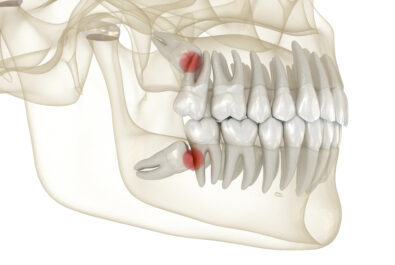Temporomandibular joint disorder, or TMJ disorder for short, can be extremely uncomfortable and can potentially even keep you from being able to open or close your mouth. The temporomandibular joint acts as a hinge in connecting your jaw to the bones of your skull. A problem with this join can result in issues chewing, talking, and opening or closing your mouth. Do you have TMJ disorder? The signs and symptoms of a problem with your joint are similar to several other dental problems. However, having your dentist take a look at your mouth and the way you can move your jaw will help them to decide whether or not you have TMJ disorder.
What Causes TMJ Disorder?
A number of things, physical and emotional, can contribute to the muscles surrounding this joint. Although dentists don’t know exactly what causes TMJ disorder, it is believed to be an issue with the muscles and parts surrounding the joint itself.
- Injury, such as whiplash, can lead to issues with your joint from causing trauma to the muscles around it.
- Stress can typically lead you to clench or grind your teeth, or tighten your jaw muscles, potentially leading to inflamed muscles.
- Grinding or clenching your teeth can put significant amounts of pressure on your temporomandibular joint.
How Do You Treat It?
Your dentist may recommend a number of different things to help relieve the symptoms you’re experiencing and to correct any issues that could be causing the problem. In doing so, they’re trying to prevent any further issues that could be detrimental to the overall health of your mouth.
To relieve any pain or swelling, you can take over-the-counter medications. In addition to the medications, heat or cold packs can be used to relieve inflammation and promote movement.
To prevent further damage to your joint, your dentist may recommend that you stick with soft foods and avoid jaw movements that would “jerk” your jaw.














